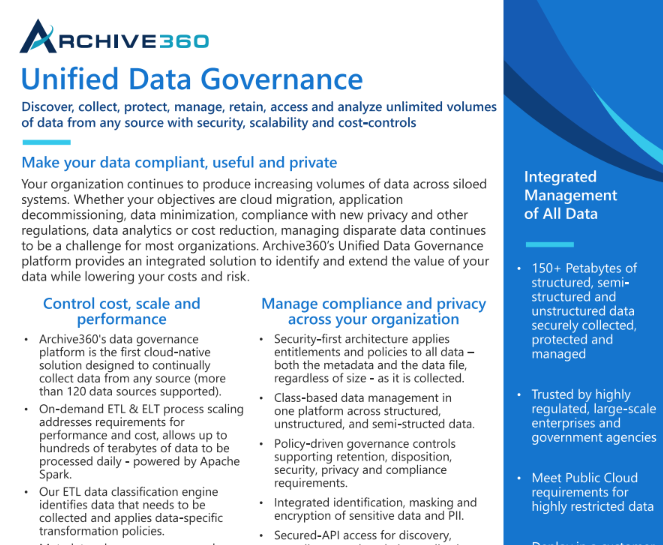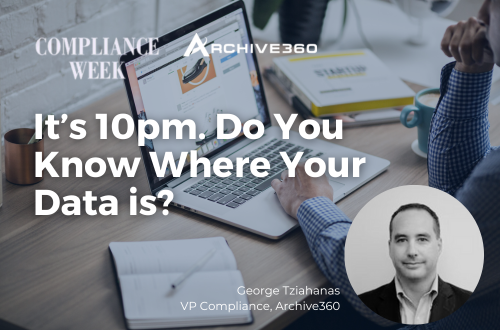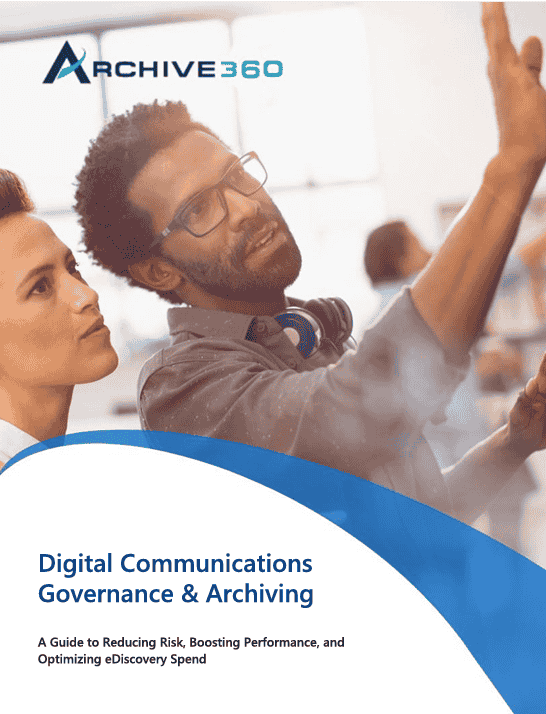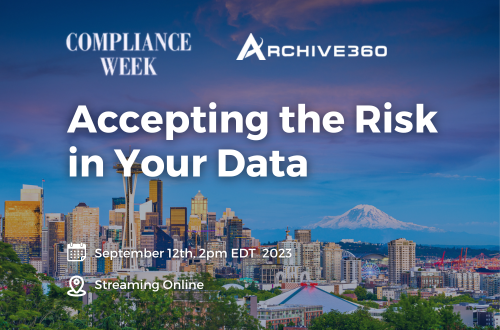Q3 Archive360 Newsletter
Take the journey to Unified Data Governance with us. Connect globally through events with our partners in innovation. Stay ontop of capital buzz and check out the latest releases from our team of experts.

Table of Contents
Jump to any section of the Newsletter
Our Business is Change. We Are Innovators.
As we head into the final quarter of 2023, we are refocusing on our core competency. Enjoy the Q3 updates that our team has prepared below and reach out to us to learn more.
A Message From Our CEO
Our Company’s top Core Value is “Our business is change. We are innovators.” As we head into the final quarter of 2023, Archive360 is refocusing on our core competency, Unified Data Governance. Relentless technical, regulatory and business changes and challenges are forcing all of us – end users and vendors – to constantly rethink what it means to manage data in the cloud. This has never been more so than today, thanks to AI, with its potential to impact every person, across every organization and in every industry. As an early adopter of AI technology, Archive360 understands both the challenges and opportunities that AI creates for our customers. Over the coming months, you’ll continue to see my team discussing the drivers and use cases for Unified Data Governance. And you’ll also hear us talking about the opportunities and risks for our customers to use AI so they can process and drive insights from enormous sets of data. For our customers and partners, we look forward to demonstrating how and why we continue to innovate on the security, scale and scope needed to govern data so that you can successfully embrace the change that this massive opportunity can provide.

The Journey to Data Governance
Data: It’s what we all rely on to give us the right answer to any number of questions. If you’re an attorney, you may need to respond to a harassment claim and have several questions regarding what the parties said and did. If you’re a customer service representative, you may need to respond to a customer who wants to know what personal data your organization has on them and how that data is being used.
These Situations Have 3 Common Objectives:
- Find accurate data that’s relevant to the situation as quickly and easily as possible.
- Access the data in a way that facilitates its analysis.
- Enable the data’s reviewers to quickly identify and deliver the appropriate information.
Your organization’s ability to meet these objectives and ensure its response provides value, while minimizing the organization’s risks, depends on its data governance policies and procedures and how they are implemented.
Traditional Approach to Information/Data Governance
For years, information/data governance programs have been implemented by organizations using an approach like this:
- The legal and compliance teams create the policies.
- The records management team trains and guides content creators and system administrators how to manage and protect that content.
- The content owners / system administrators assume responsibility for following policies and procedures.
The problem with this approach is most employees don’t consider managing data to be a priority. It’s not their primary job responsibility and, done manually, can take a lot of time. In the heat of the moment, we can easily forget, cut corners, and make mistakes. We’re human. And as a result, data being managed using this approach is being managed inconsistently and ineffectively.
With the ever-growing volumes of data and increasing number of data management regulations, particularly around data privacy and security, a new approach is desperately needed. According to Okta’s 2023 Business at Work report, the average number of applications implemented by organizations with more than 2000 employees is 212. So, a customer service representative at this size organization who needs to respond to a customer’s request for their personal information will likely need to collect data from marketing, sales, financial, support, fulfillment, and many other systems. The significant rate of data growth and the fact that data associated with a single person is distributed across multiple systems makes data governance and eDiscovery particularly challenging.
Data Governance for the Future
With advances in cloud computing, artificial intelligence and machine learning, a new approach to data governance is possible, where data management success no longer depends on content owners. The data governance process can now be automated using a set of governance rules. And instead of automating these governance rules one application at a time, it can be administered from a single platform. Given the ever-increasing volume of data, however, this platform must be able to scale to manage all types of data, not just communications, and do so securely and cost-effectively.
Unlike many of our competitors, Archive360’s cloud-native platform was designed from the beginning to be the most scalable, secure, and extensible data governance platform on the market, serving the legal, compliance, and analysis needs of organizations worldwide. Recently, we updated our website to better communicate our platform’s capabilities. Check out our updated site and learn more about our Unified Data Governance Platform.
.png?width=300&height=550&name=Product%20Updates%20cover%20(1).png)

Datasheet
Unified Data Governance
Archive360's Unified Data Governance platform enables organizations to efficiently manage and leverage their data. Our platform allows for the discovery, collection, protection, management, retention, access, and analysis of vast data volumes from various sources, all while ensuring security, scalability, and cost control.
Partners - Welcome to our Q3 2023 Newsletter!
In his introduction to this newsletter, our CEO, Bob Desteno, reminds us of Archive360’s primary Core Value: “Our business is change. We are innovators.” Our customers are increasingly asking us to support them with broader and more strategic initiatives for data governance. This, in turn, is creating additional opportunities for all our partners worldwide. Organizations are asking for support not only to implement and deploy Archive360’s software, but also to help them develop their strategy for data governance. This is an opportunity for us to work together as innovators, especially given the rapid rate of change in both the technical and business environments.
In the coming months, my team will be working with you to see how we can better engage to support our joint customers on their data governance journeys. When my team reaches out to you, please engage with them, share ideas and let’s find ways to grow our business together. In the meantime, if you have any questions or would like to reach out to me directly, please feel free to contact me at: mike.coffield@archive360.com.
Mike Coffield
VP of Global Channels

Unified Data Governance and Cloud First
US CAPITAL BUZZ
Last month, I had the pleasure of meeting many of you at the 930Gov Conference in Washington DC. For those not familiar with this event, if you’re involved in any aspect of document and records lifecycle management this is an important destination for you. What struck me about this year’s conference was the progress that so many agencies have made in not only their “cloud first” approach, but also in planning for why and how to manage different types of data and records to address a broad set of requirements. I was fortunate to attend the session led by the CIO of the US Customers and Border Patrol, Sonny Bhagowalia and CBP’s Chief Records Officer, Dawn Watts. Sonny spoke about the need for us to think about data governance not only as a requirement to protect the data, but as a fundamental need to protect our country. Our Q3 newsletter includes examples of initiatives that Archive360 is driving to help federal agencies reduce the risks and costs of managing growing volumes of different types of data and records in the cloud. As you read about them, I encourage you to think about how your data governance and records management programs help support your cloud first objectives and – to Sonny’s point – our national security.
Mary Maurer
Federal Sales Director









